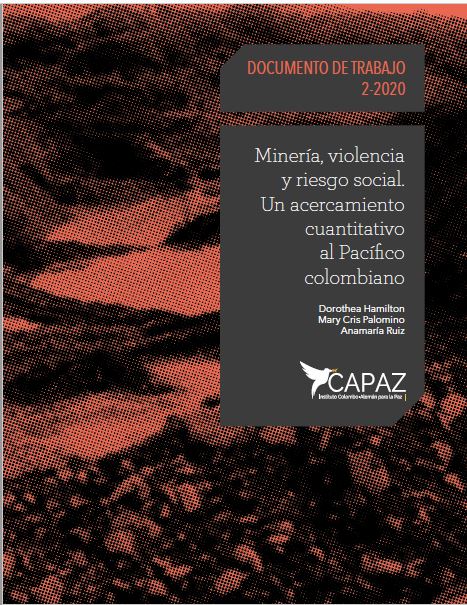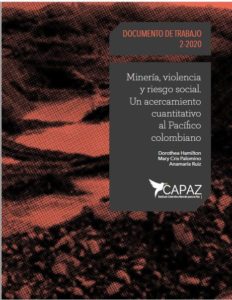
CAPAZ Working Paper (2-2020): Mining, violence, and social vulnerability

Cover of the CAPAZ WP 2-2020
CAPAZ Working Paper (2-2020), entitled “Mining, violence, and social vulnerability. A quantitative approach to the Colombian Pacific”, defines the relationship between the defence of human and environmental rights and the illegal economies existing in Colombia. The document is the result of research supported and sponsored by CAPAZ.
Abstract:
Among the problems following the signing of the Final Agreement, the persistence of violence, especially against human rights and environmental defenders (HRDEs), and illegal economies is one that stands out. This document presents the analysis at sub-national level in the Colombian Pacific departments, the spatial correlation between these phenomena and other social factors that coexist in both guises. Using multiple indicator analysis, we investigated correlations between violence, measured through the number of DDHA murders, the homicide rate and forced displacement; illegal mining, using remote images and based on the official gold production figure; as well as other social risk factors, such as: coca crops, the presence of illegal armed groups (IAGs), rural poverty and limited road accessibility. A comparison of these problems between 2006 and 2014 also reveals their temporal relationship. The data show that locations where there is alluvial mining correspond to the highest risk for DDHA violations and displacement, but not to the highest homicide rate. It was also found that mining is present in areas of greater social risk; i.e., those with higher rates of rural poverty and illegal economies.
Keywords:
Killings of human rights and environmental defenders, indicators, illegal mining, Colombian Pacific, post-conflict, social risk, violence.
CAPAZ Working Paper 2-2020 (.pdf, in Spanish)
Authors/researchers:
Dorothea Hamilton:
Lecturer and research assistant at the Institute of Geography, Justus Liebig University of Giessen (Germany), and currently studying for a PhD in Geography at the same university. Her research focuses on the relationship between conflict, peace and natural resources. Contact: Dorothea.hamilton@geogr.uni-giessen.de
Mary Cris Cusi Palomino:
Geographer from Universidad Nacional Mayor de San Marcos (Peru), with a specialisation in Geographic Information Systems. She has a master’s degree in Risk and Resource Governance from the University of Heidelberg and a master’s degree in Geography and Geomatics from Pontificia Universidad Católica de Chile. Contact: mccusi@uc.cl
Anamaría Ruiz:
Geography student at Universidad Externado de Colombia (Colombia). Contact: anamaria.ruiz@est.uexternado.edu.co
Dorothea Hamilton, Mary Cris Cusi Palomino, Anamaría Ruiz. Mining, violence, and social vulnerability. A quantitative approach to the Colombian Pacific. Bogotá, Colombia, May 2020. CAPAZ, Bogotá: May 2020. ISSN: 2711-0354.
(NW Text: Claudia Maya based on Working Paper 2-2020. English version: Tiziana Laudato)



